How Nigeria Police Force ‘Betrayed’ Its Own Officers Despite Senate Intervention
Three decades ago, a Nigerian Police Force commissioner ‘unjustly suspended’ four junior officers for an alleged wrongdoing, despite an internal orderly room trial and the Senate exonerating them. With no reinstatement or compensation, the officers continue to suffer amid neglect, and two have since died.
Before donning the Nigerian Police Force (NPF) uniform, Amos Olaniyan, in the early ‘80s, worked as a salesman for Samco Company, navigating the bustling streets of Lagos, South West Nigeria, to sell yoghurt to customers. However, his life took an unexpected turn when former Lagos State Governor Lateef Jakande’s administration banned street hawking on major roads. The policy shift left Olaniyan without a job and forced him to desperately search for new employment opportunities.
One morning, he came across a recruitment advertisement for the NPF at the Police College in Ikeja. This discovery marked a turning point in his life. Armed with just his primary school certificate, he applied and, by August 1981, was enlisted into the security agency. For Olaniyan, becoming a police officer was more than just a career move – it was a dream come true.
“I was extremely delighted,” he said. “It’s a job that has a future.”
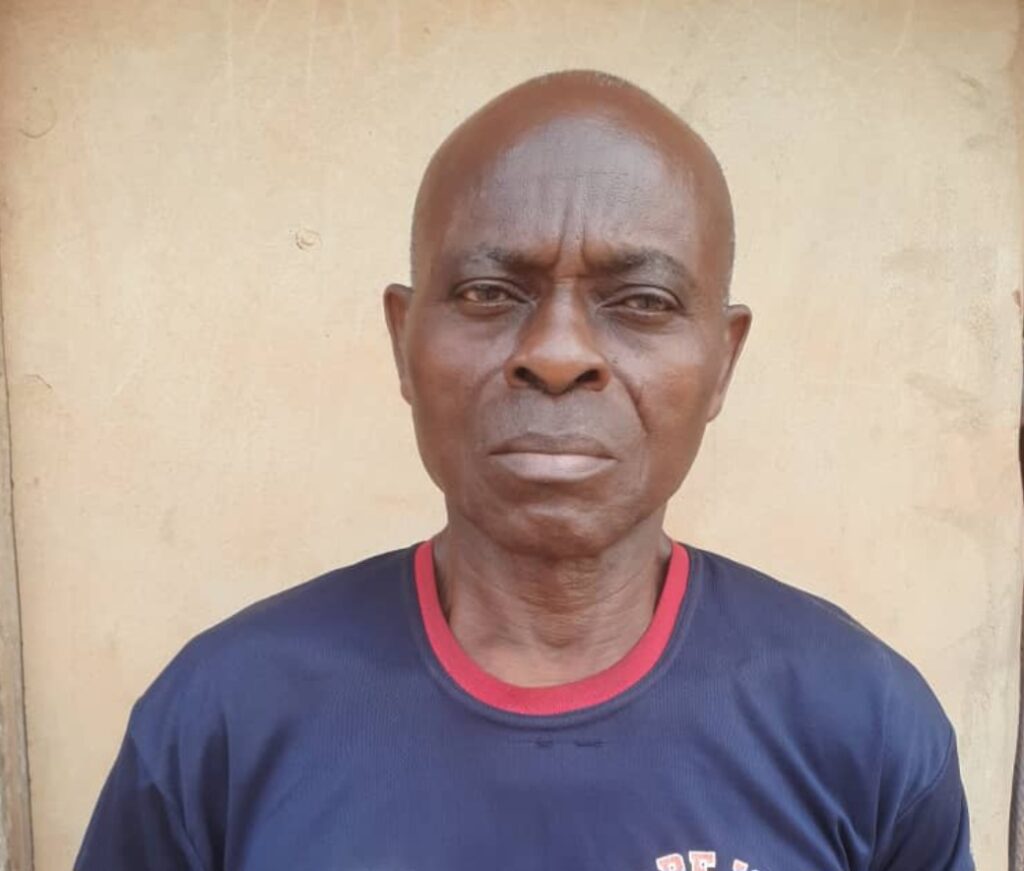
As he embarked on his policing journey, he was deployed to various police stations across the country, experiencing diverse cultures and environments. From the southern part of Nigeria to the northern region, Olaniyan said he worked tirelessly, serving his nation with pride. “I worked in almost all states of the country except Sokoto State,” he recounted.
‘Hero of high-profile arrest’
Olaniyan said he was part of a team of police that arrested notorious thieves in the country, including Lawrence Anini, which was one of his major achievements in the Force. In the ‘80s, Anini was a feared armed robber who terrorised Bendel State, now Edo and Delta states. At the height of his reign in 1986, Anini and his gang wreaked havoc, committing violent robberies, rape, and abduction. Their audacity embarrassed the Police, especially as suspicions grew that some officers were complicit in his criminal operations.
Anini’s notoriety reached unprecedented levels when he attacked a convoy of senior police officers. The Guardian Nigeria, a national newspaper, in a scathing editorial, asked, “Will they ever find Anini, ‘The Law’?’” He would later become more notorious by sending letters to media outlets, describing his criminal exploits and every next move. The audacious steps added to the intrigue surrounding his persona as a ‘legendary figure’ in Nigeria’s criminal stories.
Meanwhile, the hunt for Anini reached its climax when General Ibrahim Babangida, Nigeria’s military president at the time, launched a massive manhunt for the notorious robber and his gang members. As the nation was gripped with anticipation, law enforcement agencies intensified their efforts to bring the infamous criminals to justice.
One fateful day in December 1986, Police acted on a tip-off from the locals, and Anini was cornered at No. 26, Oyemwosa Street, Benin City in Nigeria’s South-South, where he was arrested. He was later tried, sentenced to death by Justice James Omo-Agege and executed on March 29, 1987, bringing an end to one of the darkest chapters in Nigeria’s history of violent crime.
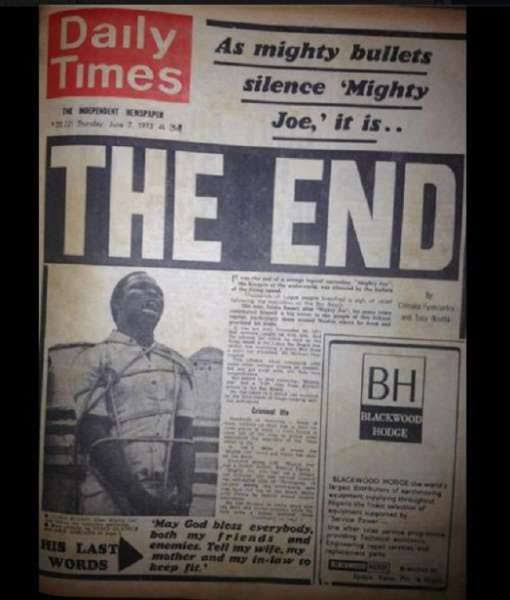
Olaniyan told HumAngle that he was part of the team that carried out the arrest. Jeremiah Useni, the then-military governor of Bendel State, recognised his heroism alongside other Police officers.
The Force acknowledged that arresting Anini required a unique blend of skill, strategy, and bravery; hence, they redeployed some officers who took part in the successful operation to different parts of the country battling robbery incidents. “In the early days of 1990, I was transferred to Ogun State,” he said.
Controversy
Meanwhile, according to Olaniyan’s account, the officer, who had served with distinction in various parts of the country, found himself at the centre of a controversy that would change his life forever in Ogun State. As part of his duties, Olaniyan was tasked with patrolling the Lagos-Ogun Road, a notorious hotspot for armed robbery.
One evening, the officer’s team experienced a flat tyre. He said they were stranded on the road when two Good Samaritans arrived, commended them for securing the expressway, and handed over some cash to Abiodun Ashabi, their team leader. But this seemingly harmless event would set off a chain reaction leading to his ‘unjust’ suspension.
“The incident happened on Oct. 11, 1994,” he recounted. “The money handed over to us on the road by two good people who had known our team leader before the day of the incident was ₦1,250.” For context, in the 90s, the minimum wage in Nigeria was around ₦250 per month. This means ₦1,250 could represent a low-income worker’s five months’ salary.
“Some minutes after the money was handed over to us, the then Commissioner of Police (CP) in Oyo State, late Abubakar Tsav, was passing with his convoy when he stopped to ask us for the money we made on patrol. I told him that I was not stupid and that if I was with money, I wouldn’t run to greet him. He told me I was bold, and he searched me. Interestingly, nothing was found on me and others. He then searched our spoiled vehicle and found the money given to us to fix our tyre on the seat,” Olaniyan added.
When the CP accused the officers of being in possession of bribes realised on the road, they vehemently denied it. Despite their protests, the CP took the money from them and drove to the then Ogun State Commissioner of Police, John Okafor, who summoned them three months later.

Before initiating their Orderly Room trial, the CP suspended four of the officers on patrol, except for Ashabi. The three others affected by the suspension alongside Olaniyan are David Okhuarobo, the late David Oloyede and the late Joseph Akaah.
“The sketchy thing is that our team leader was not announced suspended, which made us feel very uncomfortable, particularly because we did not do what we were accused of doing,” Olaniyan explained.
What happened in the Orderly Room?
The Orderly Room, headed by M.A Yusuf, the then Provost Marshal Zone 2, exonerated Olaniyan and his colleagues. According to a report obtained by HumAngle, the panel argued that the accusers failed to provide any evidence against the officers, who maintained that they were conducting routine vehicle searches on the road.
“They (suspended officers) were – duty bound to do stop-and-search on suspected vehicles. Hence, seeing them check vehicles did not amount to illegal duty, as they were duly posted on anti-robbery patrol. Had it been they were corrupt men, they would have been found extorting money. It amounts to witch-hunting for the CP, Oyo State, to have ordered the search of their vehicle after recovering nothing from them when they were searched,” part of the panel report read.
It added that “in view of the available evidence before the panel, it would amount to injustice to find these policemen and their team leader, Abiodun Ashabi, guilty… I found them not guilty as charged, and they are hereby discharged and acquitted.”
Despite being cleared of wrongdoing, the Ogun State Police Command refused to lift their verbal suspension, leaving Olaniyan and others without a salary to support their family. “On many occasions when I reported to duty, I was told that my suspension had not been lifted,” he said. “As the situation persisted for years, taking care of my family became a challenge, and I had to resort to menial jobs.”
Homeless and abandoned by wife
With no financial support, Olaniyan’s wife abandoned him, leaving with another man from their church and placing the responsibility of raising their four children solely on his shoulders. He explained that the predicament forced his children to sacrifice their aspirations. For instance, his eldest daughter, who had dreamed of becoming a medical doctor, had to settle for a part-time course in biochemistry at Lagos State Polytechnic (now Lagos State University of Science and Technology).
“The three girls I gave birth to were forced into early marriage because of poverty, and the church is sponsoring the only boy,” he told HumAngle. “I am homeless and asking for help. If not for the church that provides me with shelter, I would have died. I feel betrayed by the Police Force. My children are suffering because I chose to be a patriotic officer.”
Long cry for justice
In his quest to get justice for himself and three colleagues, Olaniyan wrote several letters to then-President Olusegun Obasanjo between 1999 and 2007, but none received a response. At one point, he tried to get Obasanjo’s attention through a close family member, but the outcome remained the same. He also sought help from former Senate President David Mark, but his pleas fell on deaf ears.
However, when late President Musa Yar’Adua took office in 2008, Olaniyan saw a glimmer of hope. He wrote to Yar’Adua, seeking his intervention, and, to his surprise, the president responded. “Late Yar’Adua was the only president that showed interest in ensuring that we get justice but he could not even complete his term in office,” Olaniyan added.
HumAngle obtained a series of letters exchanged between Olaniyan and the Yar’Adua administration on his possible reinstatement. In one of the letters, the late president asked the Police authorities to investigate the matter for possible reinstatement of the suspended officers.
In a letter dated June 6, 2008, the Police Service Commission (PSC) asked Olaniyan to “furnish the commission with the final recommendations of the Orderly Room Trial Proceedings of the case that led to your dismissal.” Olaniyan complied, providing the necessary documents, but months passed without any further response. At that point, he felt that his case was essentially hopeless if a president’s intervention could not yield any result.
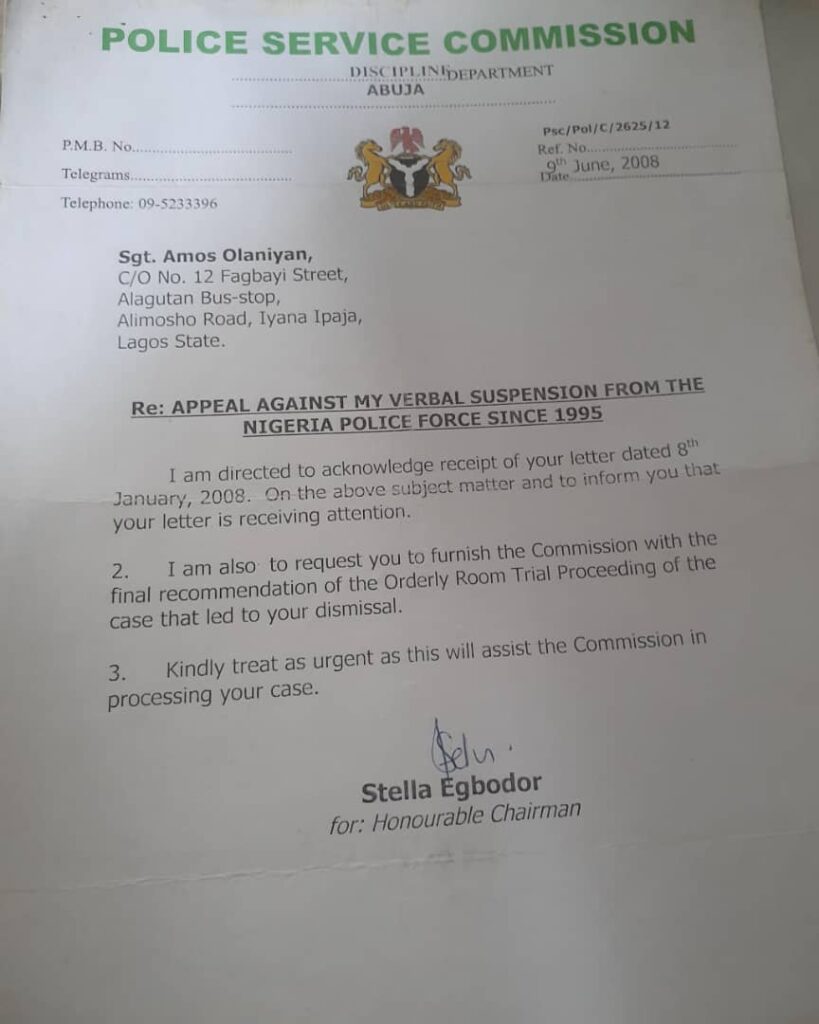
As hunger bites harder, he sought the intervention of Itse Sagay, a renowned law professor and human rights advocate, in 2011. Sagay, in a letter dated Oct. 17, 2011, wrote an appeal to former Inspector General of Police (IGP) Hafiz Ringim to reinstate Olaniyan, who had long been “wrongly suspended.” In his letter, the professor explained that Olaniyan’s suspension was a clear case of miscarriage of justice.
“In spite of clear vindication of his innocence, he has not been recalled since his suspension in late 1994…This appears to be a clear case of not only a miscarriage of justice but of the condemnation and punishment of an innocent man by default. This incident has completely devastated Olaniyan and turned his life into a permanent nightmare,” Sagay wrote in the letter. Still, he did not get any response from Ringim, leaving Olaniyan’s fate uncertain.
Nigeria’s Senate intervention
In 2015, Olaniyan sought the assistance of Solomon Adeola, the senator representing Lagos West Senatorial District at the time. The lawmaker presented a petition on Olaniyan’s behalf to the 8th Senate, highlighting the injustice he had endured. Adeola explained to the senate that Olaniyan, his constituent who had been discharged and acquitted by an Orderly Room trial, had still not been reinstated years later, “even as he still has his Police ID card and uniform.”
When the Senate invited Olaniyan regarding his verbal suspension, late Jeremiah Useni, who was the military governor of Bendel State when notorious thief Anini was arrested, had become a senator, and he still remembered and acknowledged Olaniyan’s contributions in the fight against insecurity in the 1980s. After a thorough hearing by the Senate Committee on Ethics, Privileges and Public Petitions, the committee issued a report on Oct. 10, 2015, exonerating Olaniyan of any wrongdoing.
On Dec. 15, 2015, the legislatures at the upper chamber of the National Assembly adopted the two recommendations of the committee that Olaniyan be “fully re-integrated into the police with a letter of reinstatement and apology; and that all his dues, including promotions and entitlements be fully granted and paid”.
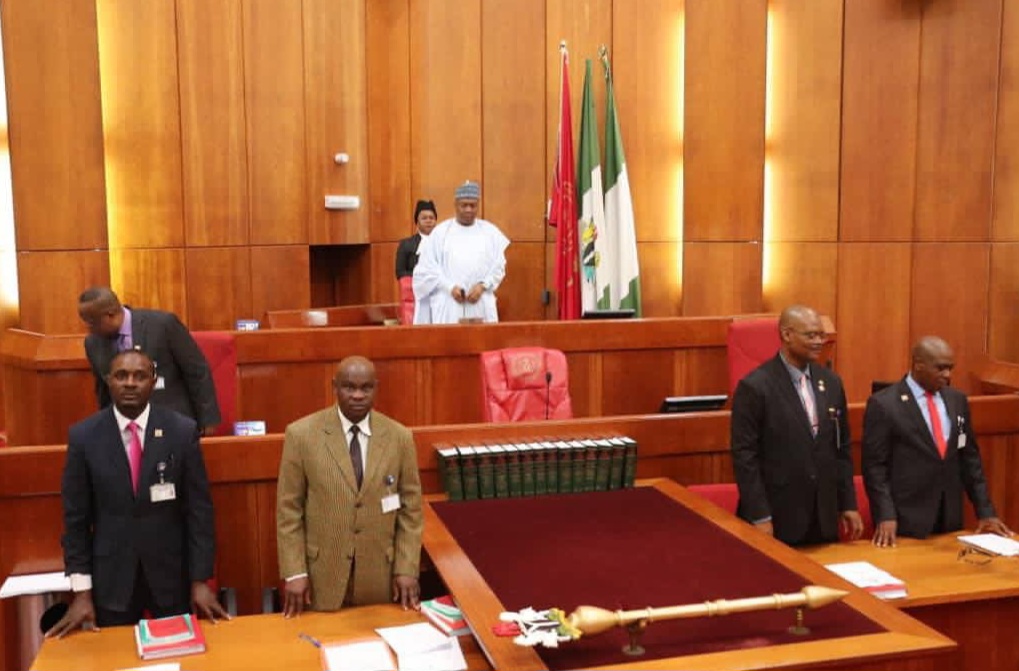
While the then Senate president, Bukola Saraki, directed the Senate Committee on Police Affairs to ensure compliance with the Senate resolutions, he urged citizens who could not afford legal fees to seek redress in court to resort to the Senate for justice.
Police retire Olaniyan without entitlements
Despite the Senate’s order to reinstate, promote, and pay Olaniyan’s entitlements, the Police ‘partially complied’ by retiring him on Feb. 26, 2016, without paying any benefits. This decision left Olaniyan confused and dissatisfied, leading him to reject the offer.
“I was shocked by the police’s reinstatement offer, which fell far short of the National Assembly’s directives,” Olaniyan told HumAngle. “Rather than being reinstated with full benefits and promotions, I was given a ‘notional reinstatement’ with no payment or promotion. To be honest, I’m still baffled by what ‘notional reinstatement’ even means.”
Notional reinstatement is a term used to describe a situation where an employee is technically reinstated to their previous position but without any actual restoration of their job, benefits, or seniority. According to legal analysts, it is often just a paperwork exercise that does not result in any significant changes or benefits for the employee.
“What the Police did was appear to have complied with the directive of the lawmakers while avoiding any real accountability. It’s really annoying because it does not provide any meaningful justice. What the Police did was simply to render his reinstatement essentially meaningless,” said Aliu Ajisafe, explaining that the Police’s actions were a clear disregard for the Senate’s authority, and the matter remains unresolved.
Reduced to a life of poverty
Like Olaniyan, his colleague, David Okhuarobo, shared how the suspension serves as a stark reminder of the dangers of unchecked power in the Police. According to him, his life was turned upside down after he was wrongly suspended from the Force as he was reduced to a life of poverty and hardship.
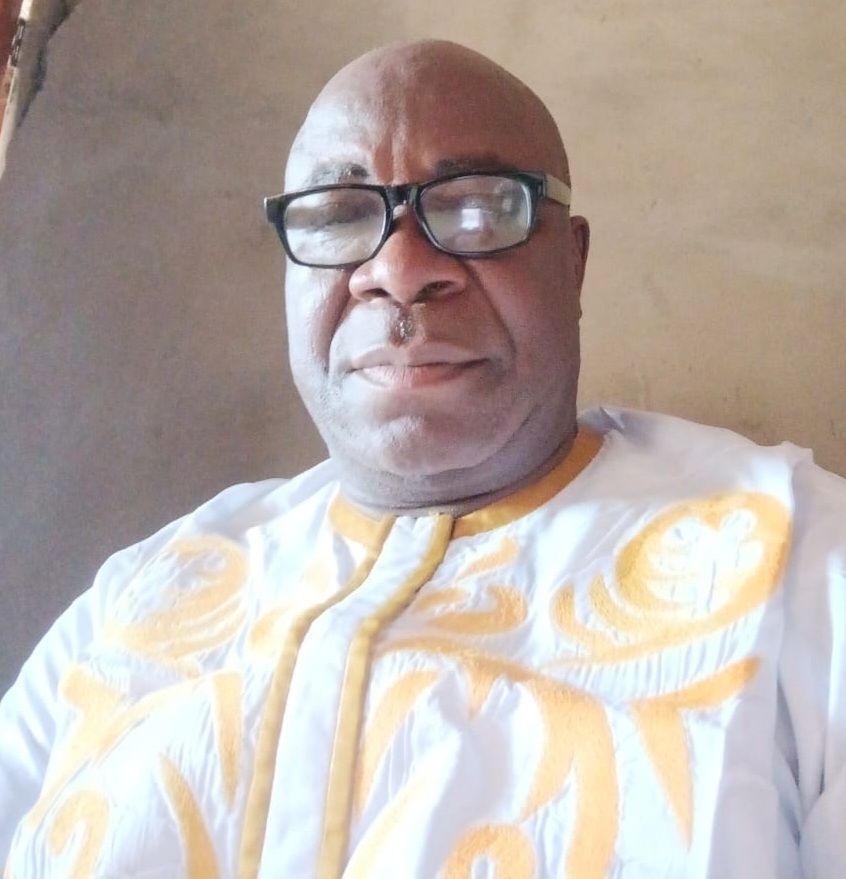
He added that despite knowing the truth, Ashabi, their team leader, who was never punished, stopped responding to his calls, making him believe that Ashabi’s close ties to those in power led to his exoneration. When Okhuarobo was evicted from his home in the barracks, his family suffered greatly.
His wife became the family’s breadwinner, providing for him and their eight children by selling soda in traffic. “I was forced to take on menial jobs to make ends meet, including working as a labourer in different construction sites. The shame and hardship eventually led to my first wife leaving me,” he told HumAngle.
With his family scattered, Okhuarobo was left to pick up life’s pieces. He survived by taking on odd jobs, including working as a private escort. Three decades after the arbitrary suspension, he regrets joining the Police Force.
“If not for the grace of God, I would have been dead by now. Up till now, life has been from hand to mouth, and my family remains scattered,” Okhuarobo added. “I deeply regret joining the Police Force, and I wouldn’t wish it on any of my children. My experience has been marred by pain, betrayal, and abandonment.”
In January 1991, he suffered a devastating injury during a checkpoint incident at Ajuwon, on the Ogun-Lagos border, when notorious robber Shina Rambo shot him, leaving him without a kneecap in his right leg.
“Tragically, four of my colleagues lost their lives in the same incident. Despite my critical condition, the Police authority arrested me in Igbobi, where they applied Plaster of Paris (POP) to my leg, saying I must have been in the know of the robbery incident to have survived.
“For two years, I was unable to walk as my relatives bore the burden of my medical expenses. It was only through my mother’s efforts that I received treatment at a native home,” he narrated. Okhuarobo added that facing suspension from the Police after his service to humanity was a bitter pill to swallow.
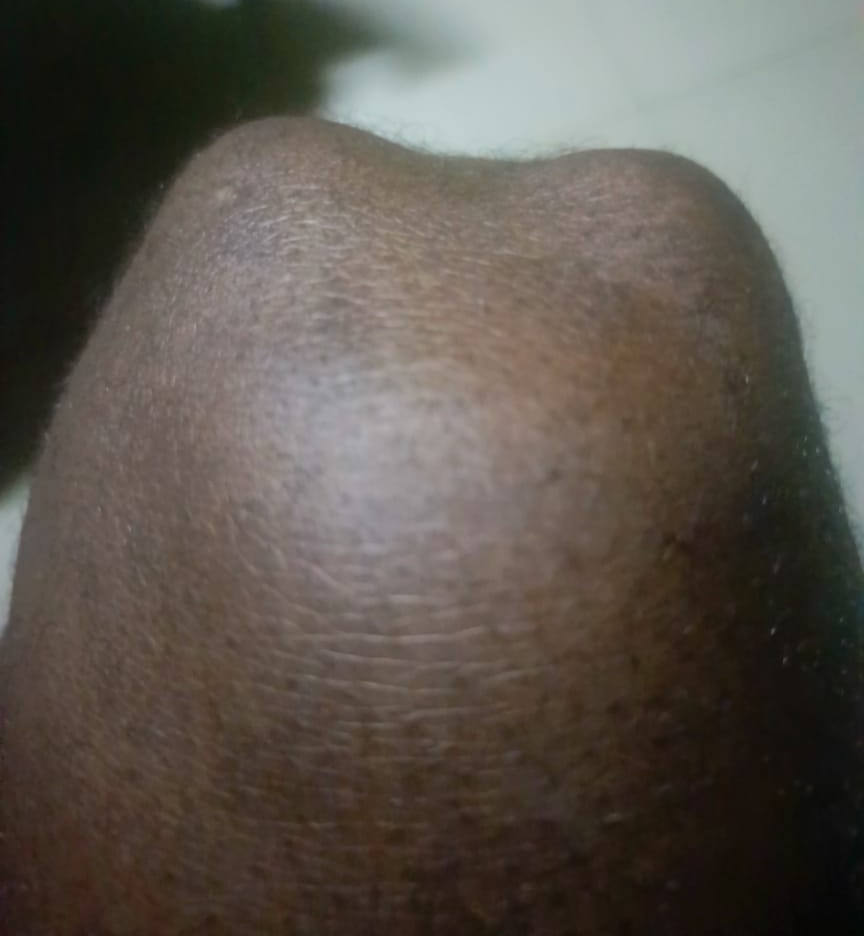
Other suspended officers die of hunger, poverty
Meanwhile, he is still grappling with the loss of his friend, Joseph Akar, who passed away in 2014 due to a lack of funds for medical treatment. The late officer needed money to seek medical attention for his haemorrhoids but could not. HumAngle searched Akar’s relatives for a detailed account of his life after suspension but could not trace anyone close to him. Other colleagues said they lost contact with his relatives after his demise. HumAngle, however, met the daughter of the late Inspector David Oloyede, who died on Dec. 3, 2019.
“The pain of losing a loved one to hunger and neglect is a wound that never fully heals,” said the young lady who asked not to be mentioned because of stigma. “What led to his death was a traumatic reminder of how he was suspended indefinitely from the Police Force for an offence he never committed.”
Though Oloyede resorted to menial jobs, including driving a taxi after the suspension, he left the job due to ridicule and financial struggles that were too much to bear.
“My father was denied his entitlements and was left without a safety net in his old age. As expected, his health began to deteriorate in 2017, and he succumbed to depression in 2019,” she explained. As she spoke about her father’s life and death, she was filled with sadness over how the Police Force betrayed its officers.
Exempted from suspension
On the other hand, Ashabi, who led the team of officers that were suspended three decades ago when he was Assistant Superintendent of Police, has risen to the rank of Assistant Inspector General in charge of Zone 17, overseeing Ondo and Ekiti State commands. HumAngle contacted him for comments, and he corroborated the accounts of the dismissed officers.
“Ordinary, we all should have been exonerated because the allegations against us were outright false. I was even at the Senate Plenary, where I gave evidence in their favour,” he said. Asked if he was the ‘authority’s boy’ to have been exempted from suspension, unlike his junior officers, Ashabi explained that disciplinary matters are handled differently for officers versus rank-and-file personnel.
“While my own case was reviewed at the appropriate level, I would not sit here as AIG to say they deserve the way they were treated by the Police Force. At one point, I heard the Senate said they should be reinstated, but it was not done,” he acknowledged.
He, however, could not provide reasons why the officers continue to suffer amid official neglect. HumAngle contacted the Police Service Commission spokesperson, Ikechukwu Ani, for comments, but he has not responded to our enquiries.
Amos Olaniyan, a former Nigerian Police officer, experienced a life-altering journey from being recognized for high-profile arrests to suffering suspension without pay over a controversy. Despite an Orderly Room exonerating him, the Ogun State Police Command never lifted his suspension, leading to poverty and family abandonment.
His efforts to seek justice included appeals to Nigerian Presidents and the Senate, with the latter recommending reinstatement with full benefits.
However, this directive was only partially followed, further deepening Olaniyan's hardship, as his life was reduced to poverty without entitlements.
The controversy also impacted his colleagues, with one dying from lack of medical funds, while another struggled with family and financial issues after suspension. Only their team leader, Abiodun Ashabi, avoided suspension, advancing to a high rank.
The Senate's recommended reinstatement remains unfulfilled by the Police, despite confirming innocence and the unjust nature of the suspensions.
This failure highlights systemic disparities and disregard for directives aimed at rectifying past injustices within the force.
Support Our Journalism
There are millions of ordinary people affected by conflict in Africa whose stories are missing in the mainstream media. HumAngle is determined to tell those challenging and under-reported stories, hoping that the people impacted by these conflicts will find the safety and security they deserve.
To ensure that we continue to provide public service coverage, we have a small favour to ask you. We want you to be part of our journalistic endeavour by contributing a token to us.
Your donation will further promote a robust, free, and independent media.
Donate HereStay Closer To The Stories That Matter





